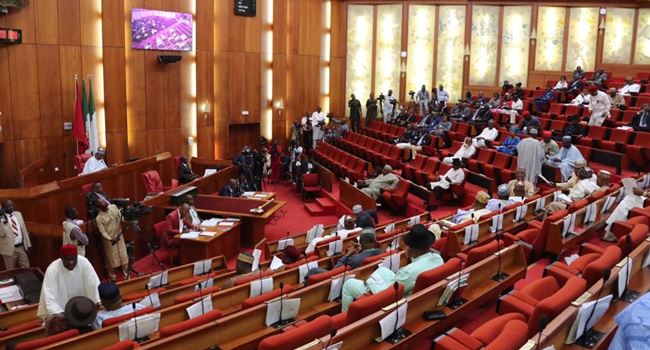News
Amid controversies, Senate demands 20% of Nigeria’s budget for constituency projects

The Nigerian Senate on Wednesday passed for second reading, a bill seeking to have a minimum of 20 per cent of Nigeria’s annual budget allocated to constituency projects.
This is coming amid claims that constituency projects have failed to achieve the intended goals and remained one of the means the lawmakers allegedly use to embezzle public funds.
The bill, sponsored by Senator Stella Oduah was first passed for first reading on November 19.
The bill proposes among other things, that projects under the Act when passed shall be community based in order to ensure that the prospective benefits are available to a widespread cross-section of the inhabitants of a particular area.
The bill is also proposing that any funding under the Act shall be for a complete project or a defined phase of a project and may include the acquisition of land and buildings.
Oduah, leading the debate explained that constituency projects was one of the unique features of Nigeria’s democratic journey so far.
She said the bill was intended to correct the top-bottom approach of governance and replace it with the bottom top approach.
But for constituency projects, majority of federal constituencies would have remained without a single federal project due to lopsided nature of project allocation in the budget, Oduah said.
“All projects shall be projects as defined under this Act when passed and may include costs related to feasibility studies, planning and design or other technical input for the project but shall not include recurrent costs of a facility and;
“Projects may include the acquisition of vehicles, machinery and other equipment for the constituency,'” she said.
According to her, rather than vilify the National Assembly on the constituency projects, people should advocate for an institutional framework for the implementation of the constituency projects as it is the case in Kenya.
“Most legislators around the world angle for such projects such that they can appeal to the voters in their constituents since they seek votes just as the executive does. In most democracies, it is a process used to obtain funding from a central government to finance projects benefiting the legislators’ local constituents.
“The Constituency Projects shall constitute 20 per cent of the Annual Budget by ensuring that certain portion of the nation’s annual budget be set aside for rural development.
“Since the inception of constituency project in Nigeria there have been misconceptions, misinterpretations and judgment of the constituency project administration. This and indeed some other factors have painted the hallowed chambers of National Assembly in bad light,” she said.
Contributing, the Deputy Chief Whip, Sabi Abdullahi said there are lots of misinterpretations and misinformation on constituency projects hence the need to act in a manner that gives every constituency a sense of belonging and a national feeling.
READ ALSO: MINIMUM WAGE: You are bound to respect new wage structure, NLC tells governors
He said, “I think it is only very fair to ensure that every part of this country have that sense of belonging, those little interventions as democratic dividends.
“The idea of getting it from bottom up is what we have actually been doing because when you go to campaign, you get a list of problems and I think it is only a bad politician that will come that when you have this opportunity to say that you want to ignore those little things that your people actually told you they are interested in.”
The bill after it’s reading for the second time, was referred to the Senate Committee on Finance for public hearing and further legislative work by the Senate President, Ahmad Lawan.
The committee was asked to report back in four weeks.
Join the conversation
Support Ripples Nigeria, hold up solutions journalism
Balanced, fearless journalism driven by data comes at huge financial costs.
As a media platform, we hold leadership accountable and will not trade the right to press freedom and free speech for a piece of cake.
If you like what we do, and are ready to uphold solutions journalism, kindly donate to the Ripples Nigeria cause.
Your support would help to ensure that citizens and institutions continue to have free access to credible and reliable information for societal development.
























